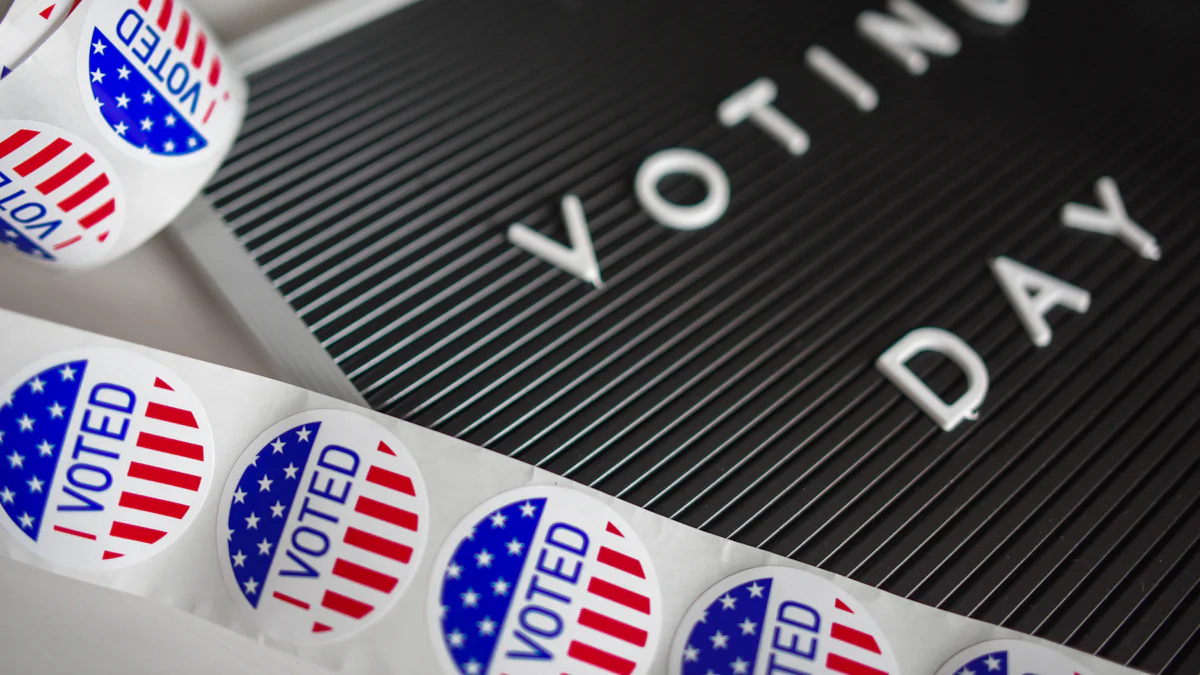The Role of AI in Political Campaigns and Propaganda

Artificial Intelligence (AI) has become a transformative force across various sectors, reshaping industries and influencing daily life. Its integration into political campaigns marks a significant shift in how elections are conducted. AI in Political Campaigns enhances strategies through data analytics, voter targeting, and social media engagement. However, it also raises ethical concerns. The ability to create deepfakes and spread disinformation poses threats to election integrity. Understanding AI's role in these contexts is crucial for navigating the challenges and opportunities it presents in shaping public opinion and democratic processes.
Understanding AI in Political Campaigns

AI Technologies Used in Campaigns
Data Analytics and Voter Targeting
AI in Political Campaigns has revolutionized how candidates reach potential voters. Data analytics plays a crucial role in this transformation. Campaigns collect vast amounts of data from various sources, such as voter registration databases, social media platforms, and public records. AI algorithms analyze this data to identify patterns and trends, allowing campaigns to target specific voter groups effectively. This process, known as voter targeting, enables campaigns to tailor their messages to resonate with different demographics. By understanding voter preferences and behaviors, campaigns can craft personalized strategies that increase the likelihood of voter engagement and support.
Social Media Monitoring and Engagement
Social media has become a powerful tool for political campaigns, and AI technologies enhance its effectiveness. AI in Political Campaigns monitors social media platforms to track public sentiment and engagement. By analyzing posts, comments, and interactions, AI tools provide insights into voter opinions and concerns. This information helps campaigns adjust their messaging and strategies in real-time. Additionally, AI-driven chatbots and automated responses facilitate direct communication with voters, providing timely information and addressing inquiries. These technologies enable campaigns to maintain a strong online presence and foster meaningful connections with their audience.
Benefits of AI in Campaign Strategies
Efficiency and Cost-Effectiveness
AI in Political Campaigns offers significant advantages in terms of efficiency and cost-effectiveness. Traditional campaign methods often require substantial resources and manpower. AI streamlines these processes by automating tasks such as data analysis, content creation, and voter outreach. This automation reduces the need for extensive human intervention, allowing campaigns to allocate resources more efficiently. As a result, campaigns can achieve their objectives with reduced costs and increased productivity. The ability to optimize operations and maximize impact makes AI an invaluable asset in modern political campaigns.
Personalized Messaging and Outreach
Personalized messaging is a key benefit of AI in Political Campaigns. By leveraging AI technologies, campaigns can deliver tailored messages to individual voters based on their preferences and interests. This approach enhances voter engagement and fosters a sense of connection between candidates and constituents. AI algorithms analyze voter data to identify specific issues and concerns that resonate with different segments of the population. Campaigns can then craft messages that address these topics, increasing the likelihood of voter support. Personalized outreach not only strengthens voter-candidate relationships but also enhances the overall effectiveness of campaign strategies.
AI and Propaganda
AI-Driven Propaganda Techniques
Deepfakes and Misinformation
AI in Political Campaigns has introduced new methods for spreading propaganda, with deepfakes and misinformation at the forefront. Deepfakes use AI to create realistic but fake videos or audio recordings. These can depict individuals saying or doing things they never did. This technology poses a significant threat to truth and transparency in political discourse. For instance, during election campaigns, AI-generated disinformation videos can mislead voters by presenting false narratives. The ability to manipulate media content so convincingly challenges the public's ability to discern fact from fiction.
Automated Content Generation
Automated content generation is another AI-driven technique used in propaganda. AI algorithms can produce large volumes of text, images, and videos quickly. Political actors leverage this capability to flood digital platforms with persuasive content. This content often aims to sway public opinion or suppress dissenting voices. A study conducted by researchers like Tomz and Goldstein examined the effectiveness of AI-generated propaganda. They found that such content can significantly influence voter perceptions. The sheer volume and speed of AI-generated content make it difficult for traditional fact-checking methods to keep up.
Ethical Concerns and Challenges
Manipulation of Public Opinion
The use of AI in Political Campaigns raises ethical concerns, particularly regarding the manipulation of public opinion. AI technologies can tailor messages to exploit individual biases and preferences. This targeted approach can amplify existing divisions within society. Governments and political entities worldwide use AI to generate propaganda that shapes public narratives. This manipulation undermines democratic processes by distorting the information landscape. Voters may find it challenging to make informed decisions when bombarded with AI-crafted messages designed to influence their beliefs.
Privacy and Data Security Issues
Privacy and data security issues also emerge as significant challenges in the context of AI in Political Campaigns. AI systems rely on vast amounts of personal data to function effectively. This data includes voter preferences, behaviors, and interactions. The collection and use of such data raise concerns about privacy violations. Unauthorized access or misuse of this information can lead to breaches of trust between voters and political entities. Ensuring data security and protecting individual privacy become paramount as AI technologies continue to evolve in the political arena.
Case Studies and Real-World Examples

Successful AI-Driven Campaigns
The Obama Campaign's Use of Data Analytics
The Obama Campaign in 2008 and 2012 set a precedent for using AI in Political Campaigns. They harnessed data analytics to revolutionize voter outreach. The campaign collected extensive data from various sources, including social media and public records. By analyzing this data, they identified voter preferences and behaviors. This allowed them to tailor messages to resonate with specific demographics. The campaign's strategic use of AI technologies enabled them to engage voters more effectively, contributing to their electoral success.
The Trump Campaign's Social Media Strategy
The Trump Campaign in 2016 demonstrated the power of AI in Political Campaigns through its innovative social media strategy. They utilized AI tools to monitor and analyze social media interactions. This approach provided insights into voter sentiments and trends. The campaign used these insights to craft targeted messages and engage directly with voters. AI-driven chatbots facilitated real-time communication, enhancing voter engagement. This strategy proved effective in shaping public opinion and securing electoral victory.
Controversial Uses of AI in Propaganda
Cambridge Analytica Scandal
The Cambridge Analytica Scandal highlighted the controversial use of AI in Political Campaigns. The firm used AI technologies to harvest data from millions of Facebook users without consent. They analyzed this data to create detailed voter profiles. These profiles enabled them to deliver highly personalized political advertisements. The scandal raised ethical concerns about privacy violations and manipulation of public opinion. It underscored the potential for AI to be misused in political contexts.
Russian Interference in U.S. Elections
Russian Interference in the 2016 U.S. elections showcased another controversial use of AI in Political Campaigns. Russian operatives employed AI tools to spread disinformation and propaganda on social media platforms. They created fake accounts and automated bots to amplify divisive content. This strategy aimed to influence voter perceptions and disrupt democratic processes. The incident highlighted the risks associated with AI-driven propaganda and the need for robust regulations to safeguard election integrity.
The Future of AI in Political Campaigns
Emerging Trends and Technologies
AI in Predictive Analytics
AI in Political Campaigns is poised to revolutionize predictive analytics. Campaigns can harness AI to forecast election outcomes by analyzing historical data and current trends. This technology allows political strategists to anticipate voter behavior and adjust their tactics accordingly. Predictive analytics can identify which issues resonate most with voters, enabling campaigns to focus their messaging on topics that matter. By leveraging AI, campaigns can make informed decisions that enhance their chances of success.
AI in Voter Behavior Analysis
Understanding voter behavior is crucial for any political campaign. AI in Political Campaigns provides tools to analyze voter interactions and preferences. By examining social media activity, search patterns, and online engagement, AI can offer insights into voter motivations. This analysis helps campaigns tailor their strategies to align with voter interests. AI-driven voter behavior analysis enables campaigns to connect with constituents on a deeper level, fostering trust and engagement.
Potential Regulations and Ethical Guidelines
Government Policies
Governments worldwide recognize the need to regulate AI in Political Campaigns. State and Federal Regulations on AI in Political Advertising aim to minimize deceptive practices. These regulations focus on reducing misinformation and ensuring transparency in political communications. By implementing strict guidelines, governments seek to protect the integrity of elections. However, challenges remain in addressing user-generated deceptive content, which may still influence voter perceptions.
Industry Standards
The development of industry standards plays a vital role in governing AI in Political Campaigns. These standards establish ethical guidelines for the use of AI technologies. They emphasize transparency, accountability, and fairness in political advertising. By adhering to these standards, political entities can build public trust and credibility. Industry standards also encourage innovation while safeguarding against the misuse of AI. As AI continues to evolve, maintaining robust ethical guidelines becomes essential to preserving democratic processes.
AI's impact on political campaigns and propaganda is profound and multifaceted. It enhances campaign strategies through data analytics and personalized messaging, yet it also raises ethical concerns. The potential for AI to accelerate disinformation and create deepfakes threatens election integrity. Policymakers and technology companies must collaborate to establish regulations that limit AI's negative effects. As Fei-Fei Li highlights, AI lacks the ability to generate critical thought or ethical plans. Therefore, society must ensure responsible use and regulation of AI technologies to safeguard democratic processes and maintain public trust.
See Also
The Impact of AI-Generated Content on Misinformation
The Ethical Dilemma of AI-Generated Journalism
The Moral Consequences of AI-Generated Content
